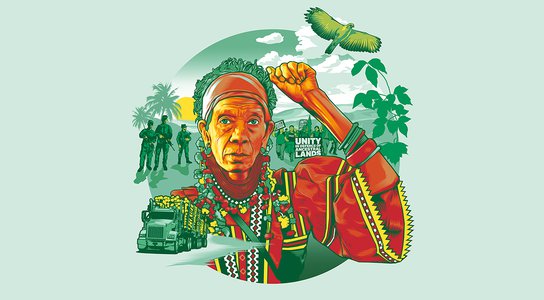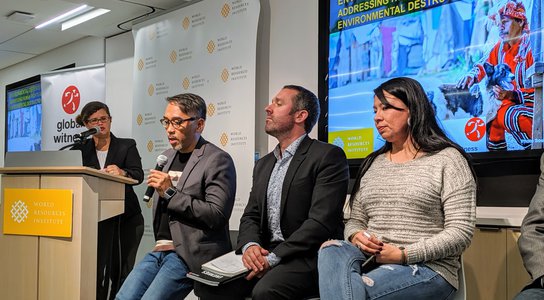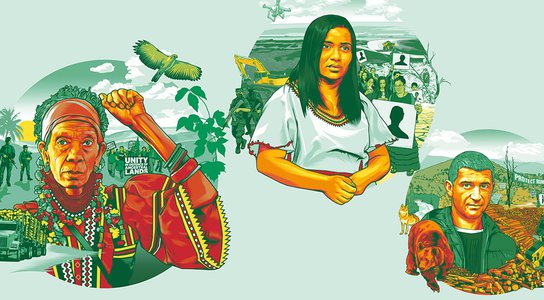On 31 July 2020, following the global launch of our annual report highlighting attacks against land and environmental defenders - Defending Tomorrow – we convened an audience of hundreds and a panel of land and environmental defenders from Colombia, Guatemala and Mexico, to discuss the challenges facing defenders in Latin America, the world’s most dangerous region for environmental activism.
As communities across the world stand up to unsustainable business practices wreaking havoc on our climate, our annual report shows those on the frontline of environmental defence are under greater threat than ever.
Global Witness opened the floor by highlighting how these land and environmental defenders are often the most vulnerable to the impact, as well as offering solutions to climate change.
In 2019, 212 defenders were killed because of their work trying to protect their homes, their land, their forests and rivers from the exploitative aspects of large-scale industrial development. Two thirds of these killings took place in Latin American countries.
Colombia leads the ranking with a dramatic increase of violence against defenders, with a total of 64 killings against community leaders in 2019. Global Witness also reported on the alarming situation concerning indigenous peoples and women defenders, and how their vulnerabilities are exacerbated by the lack of state protection.
We were joined by Alejandra Leyva, from the Mexican Center for Environmental Law CEMDA, who highlighted that they had documented an increase of threats and violence against land and environmental defenders as a consequence of reforms to the energy sector, expressing their particular concern for the stigmatisation of women defenders in this context. “Particularly in women, attacks focus on their private lives as well as on their relatives. Available data and sources documenting attacks do not shed light on these situations” she remarked during her presentation.
The Protection Unit for Human Rights Defenders in Guatemala UDEFEGUA, represented by Jorge Santos pointed out how violence and threats against human rights defenders in Central America are part of a governmental strategy to preserve private investment. According to Udefegua existing data, In Guatemala “32% of documented attacks against human rights defenders were perpetrated against the ones that stand up for the territory, land, natural resources and the environment.” Jorge delved into building a more sustainable social and economic model, as the more effective response to prevent further attacks against defenders.
Lourdes Castro, from Somos Defensores Colombia, emphasised the lack of efficacy of the Peace Agreement and how the failure to implement it has paved the way for a context of increased violence and aggression against land defenders. Somos Defensores also referred to indigenous leaders in Colombia as the most vulnerable group amongst defenders and reported on the increase of impunity for crimes against defenders.
Lastly, Angélica Ortiz, member of the Wayuu Women’s Force Movement from La Guajira in Colombia, shared her heart-felt testimony on her fight against the coal mine industry in her region and the persecution faced by her and other women defenders in Colombia. “Our ‘big house’ is slowly dying because of all the damage we are causing. Wildlife, vegetation, access to water and ancestral sites are devastated.”
New threats amidst the pandemic
Despite the strict lockdowns in many countries, panellists said that governments continued to allow the extractive sector to carry out their activities in normal conditions, under the “essential workers” category.
On the contrary, all of the panellists agreed on the negative impact that COVID-19 has had over the protection of land and environmental defenders in Latin America, which has ultimately led to a context of increased vulnerability and impunity.
Alejandra Leyva from CEMDA emphasised the vulnerability defenders face in daily life. The pandemic has further exposed the lack of protection existing in Mexico for those who stand up for sustainable change. These days, more than usual, the lack of access to justice as well as to public information has left defenders under fragile conditions.
Escazú Agreement: an invaluable opportunity
Given the increasing threats against defenders all over Latin America, the Regional Agreement on Access to Information, Public Participation and Justice in Environmental Matters in Latin America and the Caribbean – known as the Escazú Agreement - is a vital opportunity. The treaty “aims to combat inequality and discrimination and to guarantee the rights of every person to a healthy environment and to sustainable development”.
Despite 24 states approving its final text in March 2018, the agreement has not yet been ratified by a minimum of 11 countries for it to enter into force. However, civil society alongside some of the states and multilateral organisations are pushing to get more countries on board. Neither México nor Guatemala has moved forward to do so; only Colombia ratified the treaty.
The panellists expressed that the agreement would be a firm first step to cement a more respectful culture and to tackle the profound imbalances that persist all over the region. “The experiences have shown that (these mechanisms) become a transforming tool as it expresses the chance to develop further actions on human rights enforceability as well as a to provide adequate protection,” finalises Lourdes Castro, from Somos Defensores Colombia.
Preview image credit: Benjamin Wachenje / Global Witness


